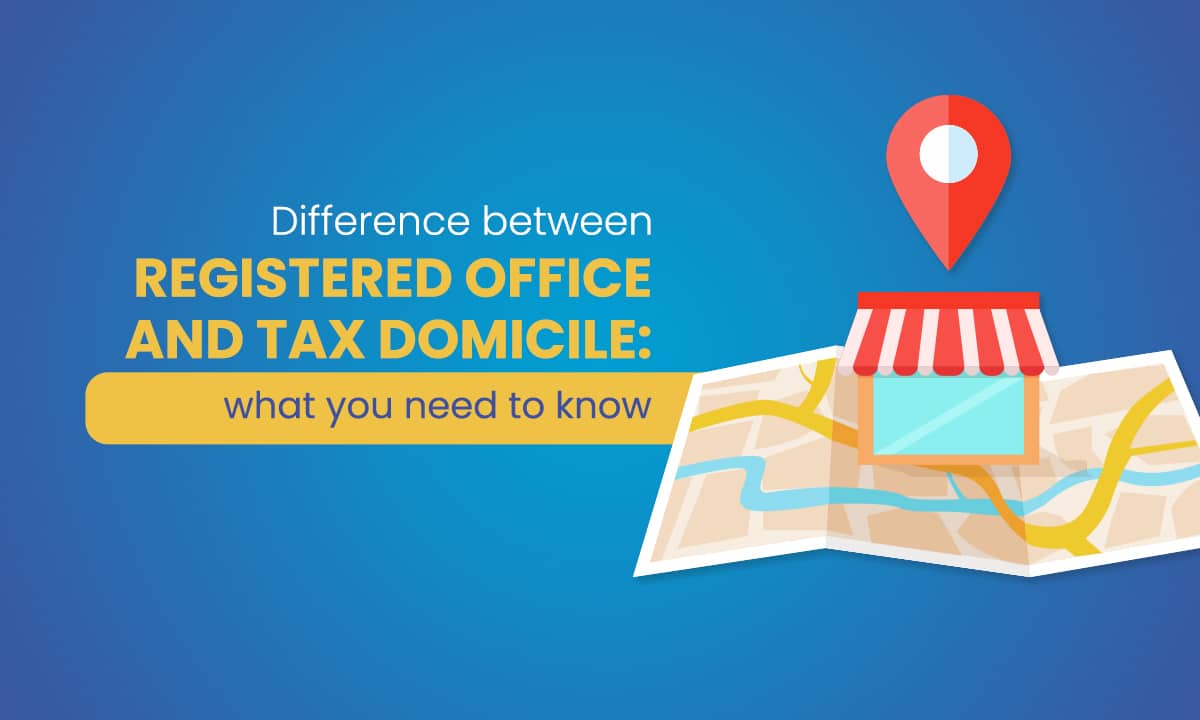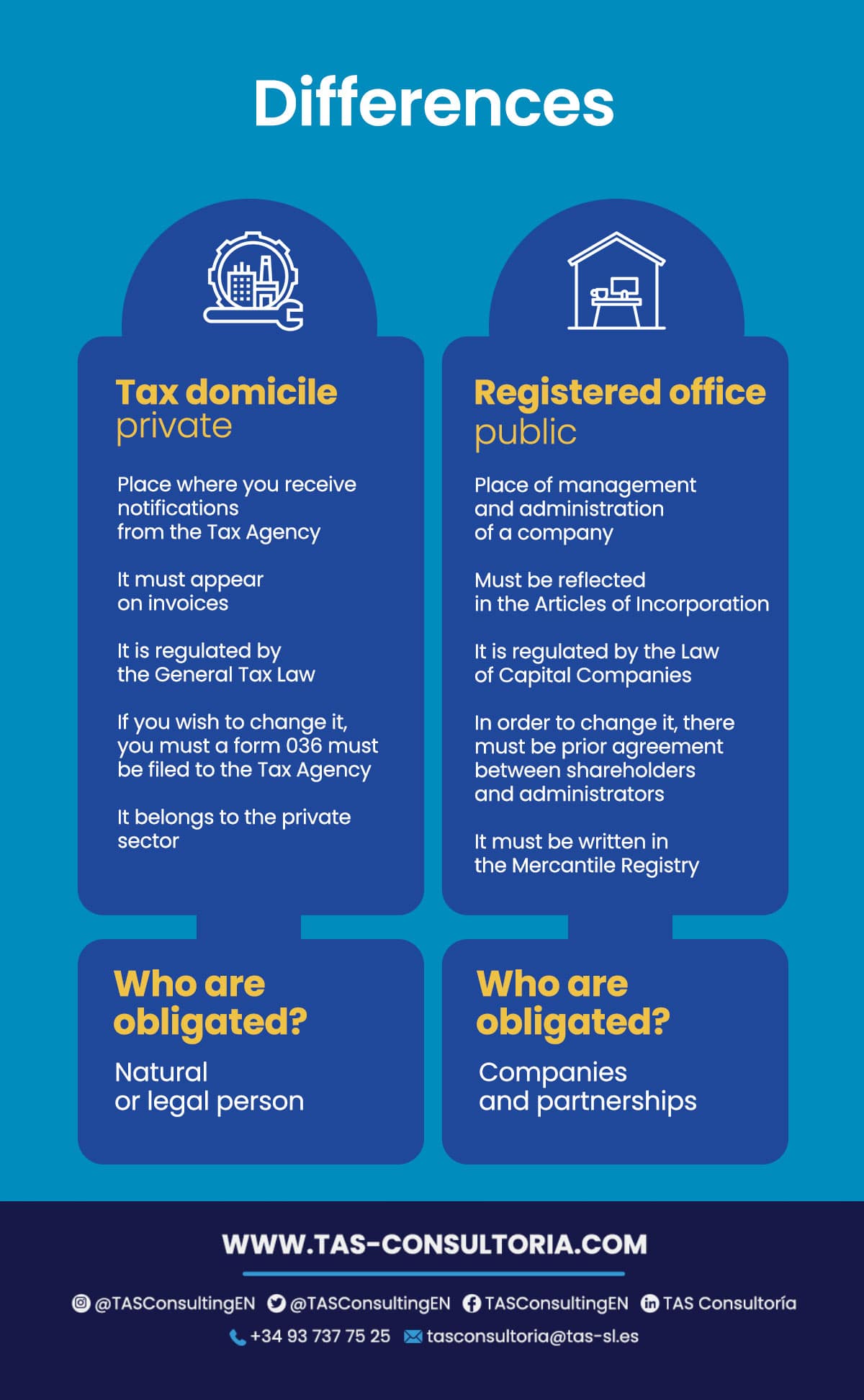The terms tax domicile and registered office are divided by a very thin line that can confuse many people. However, it is essential that, as a good entrepreneur or self-employed, you know how to distinguish one from the other. Do you want to know the difference between registered office and tax domicile? Then you’ve come to the right place, because here we will tell you everything you need to know, come on!
What is the tax domicile?
Tax domicile is understood as the place where the taxpayer will be located in its obligations with the Treasury, which will be responsible for determining the assignment to a branch of a specific Tax Agency.
To explain it in a simpler way, the tax domicile is the place where an individual or legal entity is legally located and where it will receive the notifications and notices corresponding to its tax obligations.
Thus, the tax domicile will indicate to the Treasury and other Public Administrations where to send their notifications. However, nowadays, it is possible to receive them through the electronic office, just by accessing with a username and password.
Once you are registered as an entrepreneur, you must choose the tax domicile by means of Form 036, which can be modified at any time by submitting a new Form 036 filled in with the new data to be registered.
In this regard, anyone wishing to register a tax domicile must take into account the following aspects:
For individuals, their tax domicile will coincide with their habitual residence.
The self-employed and self-employed must register their tax domicile and that this must coincide with their habitual residence or the place where they carry out their business.
The tax domicile of companies and corporations must coincide with the place where the management of the business activity is carried out. Thus, it is usual that the tax domicile and the corporate domicile coincide.
Finally, it is important to mention that the fiscal address must appear on all invoices you issue and receive in your business.
What is the registered office?
As for the registered office, also known as commercial address, it is the place where the company’s administrative center is located, as well as its address or it can also be the place where the main establishment of the company is located.
This type of address is exclusive for companies, which means that if you are self-employed you do not have to worry about having one, as you will only need the fiscal address.
In this sense, the choice of tax domicile is essential for those legal entities of a mercantile nature and can only be modified by means of public deeds -which require the signature of a notary- and then registered in the Mercantile Registry until it is finally sent to the Tax Agency.
It is important that you think very well about where you want your company’s registered office to be located, since changing it will require a rather slow and bureaucratic process, that is to say, a tedious one.
On the other hand, with regard to the registered office of civil societies, community of goods or any other company that is not obliged to be registered in the Mercantile Registry, you will not need a notarial public deed or a registration deed.
You may also be interested in: 10 steps to create your own company
So, what is the difference between registered office and tax domicile?
As we have already mentioned in previous paragraphs, the differences between registered office and tax domicile can be very subtle, which is why many businessmen tend to confuse them.
However, considering that both have different and highly relevant implications, it is essential that you learn to distinguish between them as soon as possible. Moreover, it should be noted that this difference only affects companies and firms, since, as mentioned above, self-employed and freelancers do not need a registered office.
In this regard, the following are the main differences between the two concepts:
The tax domicile is the place where notifications from the Tax Agency will be received and which must appear on invoices issued and received by the company.
The tax domicile is mandatory for individuals and legal entities, and the corporate domicile is mandatory for corporations.
The tax domicile will be regulated by the General Tax Law, while the corporate domicile will be regulated by the Capital Companies Law.
The fiscal domicile will be private, while the tax domicile will be public and, in addition, it is recorded by the Commercial Registry.
The registered office must be modified through an agreement between the partners or administrators; on the other hand, the tax domicile is done by means of Form 036, with which the Tax Agency is informed.
In our infographic below we show you other differences to keep in mind from the definition of both terms. You can save it and refer to it whenever you need it:
You may also be interested in: Opening license in Spain: how to obtain it?
An example of corporate and tax domicile
Let’s give an example: a textile company has a factory where they manufacture the clothes that will later be sold to retailers in Huelva. In this same factory, the company has offices from which they carry out business management and administration.
In this case, the tax domicile must coincide with the place where the company’s offices are located, that is to say, the address of the offices located in Huelva.
On the other hand, in the case of the registered office, this may or may not coincide with the tax domicile, so that it can be set at the place where the company’s offices are located or at the domicile or place where the person responsible for the administration and management of the company resides.
You may also be interested in: How to register a trade name in Spain?
As you may have seen, the line that makes the difference between registered office and tax domicile is indeed a thin one, but we hope that thanks to our article you will be able to understand both terms better than before. If you want to continue enjoying content like this and learn about the steps and processes to have your own company, subscribe to our blog at TAS Consulting. And if you need advice, request a free consultation through our website and our professionals will be happy to assist you.






Your email address will not be published .
Required fields are marked with *